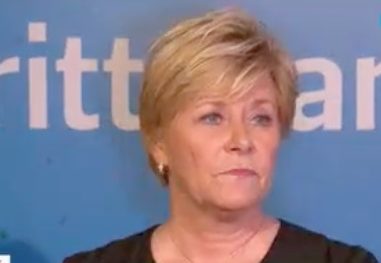UPDATED: Prime Minister Erna Solberg has lost her majority in Parliament, almost one year to the day after finally won it. Progress Party leader Siv Jensen decided Monday to withdraw from Solberg’s conservative government coalition, after yet another conflict with Progress’ government partners.

“I took the Progress Party into the government, now I’m taking Progress out again,” Jensen told reporters early Monday afternoon. “I’m doing this because it’s the only right thing to do. We simply haven’t been able to carry out enough of the Progress Party’s politics to make it worthwhile to take more losses.”
The most recent, and noisy, conflict has been over the repatriation of a Norwegian-Pakistani widow of a Norwegian terrorist in Syria, and her two small children. All the government parties wanted to help the children, one of whom is believed to be seriously ill, but Progress didn’t want “to lift a finger” to help their mother. Solberg refused to risk allowing a Norwegian child to die abroad “on our watch,” and the family returned to Norway over the weekend.
An angry Jensen and her party fellows had first claimed they would present a list of demands to Solberg on Monday, as a means of winning compensation for the political loss on the repatriation issue. Instead, after a mid-day meeting with Solberg, Jensen announced her party would leave the coalition and return to the opposition in Parliament.
Will still support Solberg as prime minister
The withdrawal of Progress, which won 15.2 percent of the vote in the last parliamentary election, leaves Solberg and her Conservative Party with less than 35 percent of the vote and just 53 seats in Parliament. The left-center opposition parties collectively hold 81 and Progress 27 on its own.
That means Solberg’s government could now fall on any given issue if Progress is opposed. Jensen stressed, however, that it was “natural” for Progress to still view Solberg as its choice for prime minister. “We don’t have any wish to replace the prime minister in the country,” Jensen said at a hastily-called press conference. “We believe Solberg is the right person to lead the country, also in the time to come.”
Jensen made it clear, however, that Progress no longer feels any obligation to support the platform hammered out a year ago when the Christian Democrats joined Solberg’s coalition and finally gave it a majority. Jensen vowed at the same time that Progress, which has fallen badly in recent public opinion polls, would now become “a tougher and even more clear party” in the months ahead.
Small parties proved powerful
While Jensen and Solberg got along fairly well during the first five years of their coalition, it was after the small Liberal Party and then the equally small Christian Democrats joined them (in January 2018 and January 2019 respectively) that friction really emerged. Each of the new government members won only around 4.3 percent of the vote in the last election in 2017, but that was all Jensen and Solberg needed for the cherished majority.
They did agree on last year’s platform, but otherwise have had major conflicts over issues from road tolls to acceptance of refugees and other immigration issues. Jensen has said she felt the two small parties were proving to be too powerful, prevailing too often on issues that Progress opposed.
Solberg accepted Progress’ withdrawal and thanked both Jensen and her party “for the job that have done, both in the government and in Parliament, to find good political solutions.” Solberg now intends to carry on as leader of a minority government with the Liberals and Christian Democrats, and, she hopes, support from Progress in Parliament.
newsinenglish.no/Nina Berglund

